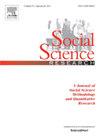Well-being scarring effects of college non-completion
IF 3.5
2区 社会学
Q1 SOCIOLOGY
引用次数: 0
Abstract
Little is known about the socio-emotional consequences of dropping out of college. Here, we investigate the effects of college non-completion on a range of markers for general psychological well-being (self-esteem, life satisfaction, and fear of failure) as well as health-related well-being (self-rated general health and clinical depressive symptoms). Based on rich panel data from Germany in combination with entropy balancing, we find that by around age 31, non-completers fared worse compared to college graduates as well as non-college goers, i.e. students who were eligible to enter college but decided against it. About 18 years after leaving college, when non-completers were aged 40, their psychological and health-related well-being was still lower than that of graduates, while non-completers and non-goers did not differ significantly regarding their well-being. We conclude that adapting to educational discontinuation is difficult and discuss potential policy measures to protect individuals from long-term adverse consequences.
未完成大学学业的幸福感疤痕效应
人们对大学辍学的社会情感后果知之甚少。在这里,我们调查了未完成大学学业对一般心理健康(自尊、生活满意度和对失败的恐惧)以及与健康相关的健康(自我评估的一般健康和临床抑郁症状)的一系列指标的影响。基于来自德国的丰富面板数据,结合熵平衡,我们发现,到31岁左右,未完成学业的人比大学毕业生和非大学学生(即有资格进入大学但决定不上大学的学生)的表现更差。大学毕业约18年后,当非完成者40岁时,他们的心理和健康相关幸福感仍低于大学毕业生,而非完成者和非完成者在幸福感方面没有显著差异。我们得出结论,适应教育中断是困难的,并讨论了潜在的政策措施,以保护个人免受长期不利后果。
本文章由计算机程序翻译,如有差异,请以英文原文为准。
求助全文
约1分钟内获得全文
求助全文
来源期刊

Social Science Research
SOCIOLOGY-
CiteScore
4.30
自引率
4.00%
发文量
0
审稿时长
65 days
期刊介绍:
Social Science Research publishes papers devoted to quantitative social science research and methodology. The journal features articles that illustrate the use of quantitative methods in the empirical solution of substantive problems, and emphasizes those concerned with issues or methods that cut across traditional disciplinary lines. Special attention is given to methods that have been used by only one particular social science discipline, but that may have application to a broader range of areas.
 求助内容:
求助内容: 应助结果提醒方式:
应助结果提醒方式:


